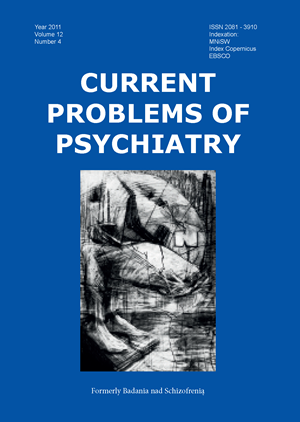Review of Internet addiction comorbities and physiological parameters
Słowa kluczowe:
Internet Addiction, comorbidity, physiological parametersAbstrakt
Despite the growing research collective regarding Internet Addiction (IAD) and its demographics, lifestyle influences, and predic-tors very little experimentation has been done to assess IAD comorbidities and associated physiological parameters [1]. Cross-sectional studies that have been performed often determine a high comorbidity rate of IAD with psychiatric disorders such as attention deficit hyperactivity disorder (ADHD) and affective disorders [2]. However, despite a similar associative incidence rate, Borderline Personality Disorder (BPD) is seldom mentioned in such analysis’. This article attempts to highlight IAD comorbidities with particular emphasis on the literature written regarding BPD and IAD. It will also examine various physiological parameters that have been assessed and suggest possible treatment modalities that may be effective for this morbidity in the future.
Bibliografia
1. Lu DW, Wang JW, Huang AC: Differentiation of Internet addiction risk level based on autonomic nervous responses: the Internet-addiction hypothesis of autonomic activity. Cyberpsychol Behav Soc Netw 2010;13(4):371-378.
2. Petersen KU, Weymann N, Schelb Y, Thiel R, Thomasius R: [Pathological Internet use-epidemiology, diagnostics, cooccurring disorders and treatment]. Fortschr Neurol Psychiatr 2009;77(5):263-271.
3. Billieux J, Chanal J, Khazaal Y, Rochat L, Gay P, Zullino D, Van der Linden M: Psychological predictors of problematic involvement in massively multiplayer online role-playing games: illustration in a sample of male cybercafe players. Psychopathology 2011;44(3):165-171.
4. Widyanto L, Griffiths MD, Brunsden V: A psychometric compareson of the Internet Addiction Test, the Internet-Related Problem Scale, and self-diagnosis. Cyberpsychol Behav Soc Netw 2011;14(3):141-149
5. Clark DJ, Frith KH: The development and initial testing of the Internet Consequences Scales (ICONS). Comput Inform Nurs 2005;23(5):285-291.
6. Yang LS, Zhang ZH, Hao JH, Sun YH: Association between adolescent internet addiction and suicidal behaviors. Zhonghua Liu Xing Bing Xue Za Zhi 2010;31(10):1115-1119.
7. Kim Y, Park JY, Kim SB, Jung IK, Lim YS, Kim JH: The effects of Internet addiction on the lifestyle and dietary behavior of Korean adolescents. Nutr Res Pract 2010;4(1):51-57.
8. Ko CH, Yen JY, Chen CS, Yeh YC, Yen CF: Predictive values of psychiatric symptoms for internet addiction in adolescents: a 2-year prospective study. Arch Pediatr Adolesc Med 2009;163(10):937-943.
9. Jang KS, Hwang SY, Choi JY: Internet addiction and psychiatric symptoms among Korean adolescents. J Sch Health 2008;78(3):165-171.
10. Black DW, Belsare G, Schlosser S: Clinical features, psychiatric comorbidity, and health-related quality of life in persons reporting compulsive computer use behavior. J Clin Psychiatry 1999;60(12):839-844.
11. Ha JH, Yoo HJ, Cho IH, Chin B, Shin D, Kim JH: Psychiatric comorbidity assessed in Korean children and adolescents who screen positive for Internet addiction. J Clin Psychiatry 2006;67(5):821-826.
12. Whang LS, Lee S, Chang G: Internet over-users› psychological profiles: a behavior sampling analysis on internet addiction. Cyberpsychol Behav 2003;6(2):143-150.
13. Tosun LP, Lajunen T: Why do young adults develop a passion for Internet activities? The associations among personality, revealing «true self» on the Internet, and passion for the Internet. Cyberpsychol Behav 2009;12(4):401-406.
14. Sussman S, Lisha N, Griffiths M: Prevalence of the addictions: a problem of the majority or the minority? Eval Health Prof 2011;34(1):3-56.
15. Bernardi S, Pallanti S: Internet addiction: a descriptive clinical study focusing on comorbidities and dissociative symptoms. Compr Psychiatry 2009;50(6):510-516.
16. Bray A: The extended mind and borderline personality disorder. Australas Psychiatry 2008;16(1):8-12.
17. Sieswerda S, Arntz A, Wolfis M: Evaluations of emotional noninterpersonal situations by patients with borderline personality disorder. J Behav Ther Exp Psychiatry 2005;36(3):209-225.
18. Unoka Z, Seres I, Aspan N, Bodi N, Keri S: Trust game reveals restricted interpersonal transactions in patients with borderline personality disorder. J Pers Disord 2009;23(4):399-409.
19. Zhu TM, Li H, Du YP, Zheng Z, Jin RJ: [Intervention on network craving and encephalofluctuogram in patients with internet addiction disorder: a randomized controlled trial]. Zhongguo Zhen Jiu 2011;31(5):395-399.
20. Han DH, Hwang JW, Renshaw PF: Bupropion sustained release treatment decreases craving for video games and cueinduced brain activity in patients with Internet video game addiction. Exp Clin Psychopharmacol 2010;18(4):297-304.
21. Han DH, Renshaw PF: Bupropion in the treatment of problematic online game play in patients with major depressive disorder. J Psychopharmacol 2011.
Pobrania
Opublikowane
Numer
Dział
Licencja
Prawa autorskie (c) 2011 Autorzy

Praca jest udostępniana na licencji Creative Commons Attribution-NonCommercial-NoDerivatives 3.0 Unported License.


